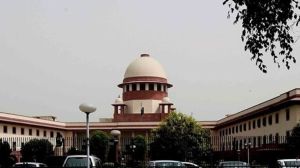SC rejects Novartis plea for patent protection
Glivec: Pharma giant's defeat is key victory for generic drugs
The Supreme Court on Monday firmly rejected Swiss drugmaker Novartis AGs demand for exclusive patent rights on cancer drug Glivec,ruling that the drug had failed in both the tests of invention and patentability under Indian law.
The verdict in the case,that was seen as a battle between research and innovation on one side and public health and affordability on the other,boosts the prospect of producing cheaper generic versions of lifesaving drugs in the country.
But the rulings effect will be felt well beyond the limited number of patients in India who need Glivec.
On the one hand,it will help maintain Indias role as the worlds most important provider of cheap medicines,which is critical in the global fight against HIV/AIDS and other diseases. Glivec costs Rs 1.2 lakh for a months dose; generic drugs manufactured by Indian firms cost between Rs 8,000 and 12,000 for the same dose.
On the other hand,drug company executives and others argued that Indias failure to grant patents for critical medicines and Glivec is widely recognised as one of the most important medical discoveries in decades is a short-sighted strategy that undermines a vital system for funding new discoveries.
India,being the pharmacy capital of the world,can continue to produce affordable,high-quality medicines without the threat of patents for minor modifications of known medicines, said Dr Yusuf K Hamied,chairman of Cipla.
In a televised interview,Ranjit Shahani,vice-chairman of Novartiss Indian subsidiary,said companies like Novartis would invest less money in research in India as a result of the ruling. We hope that the ecosystem for intellectual property in the country improves, he said.
In an official release,Novartis said the denial of patent clarifies limited intellectual property protection and discourages future innovation in India.
The Supreme Court bench led by Justice Aftab Alam held that Novartis had failed to establish either that the compound Imatinib Mesylate was a new product invented beyond the existing Zimmermann patent,or that its beta crystalline form enhanced therapeutic efficacy.
We hold and find that Imatinib Mesylate is a known substance from the Zimmermann patent itself. Not only is Imatinib Mesylate known as a substance in the Zimmermann patent,but its pharmacological properties are also known in the Zimmermann patent and in the article published in the Cancer Research journal, the court said while dismissing Novartiss appeal with cost.
Mentioning that the patent law in India was in its infancy,the bench said that it could not help the law develop along lines in which there was a vast gap between protection and disclosure under a patent.
The court also disapproved of situations where the scope of the patent is determined not on the intrinsic worth of the invention but by the artful drafting of its claims by skillful lawyers,and where patents are traded as a commodity not for production and marketing of the patented products but to search for someone who may be sued for infringement of the patent.
Domestic drug manufacturer associations,including Indian Pharmaceutical Alliance and Indian Drug Manufacturers Association,hailed the judgment.
Novartis had exclusive rights over the Zimmermann patent,which also used Imatinib Mesylate. However,it sought a fresh patent for Glivec for India,saying this drug used a beta crystalline form of Imatinib Mesylate,which was an invented product created through innovative processes not known for the previous patent.
After the Intellectual Property Rights Board refused to allow a patent on Glivec on the ground that it was only an amended version of the known compound Imatinib Mesylate,the pharma giant moved the apex court.
Natco Pharma and Cancer Patients Aid Association participated in the proceedings,and raised serious objections against Novartiss claims of innovation and enhanced efficacy for procuring the patent.
The bench held that for grant of patent,a subject must satisfy the twin tests of invention and patentability. It termed as unacceptable the contention that a test of enhanced efficacy was not required when the product was prima facie established to be an invention.
It also referred to Novartiss patent application,in which the company makes a clear and unambiguous admission that all therapeutic qualities of the beta crystalline form of Imatinib Mesylate are also possessed by Imatinib in free base form.
In this case,there is absolutely nothing on this score apart from the adroit submissions of the counsel. No material has been offered to indicate that the beta crystalline form of Imatinib Mesylate will produce an enhanced or superior efficacy (therapeutic) on molecular basis than what could be achieved with Imatinib free base in vivo animal model, the court said.
FIRM REJECTION
SC says demand for patent fails tests of both invention and patentability. All pharmacological properties of beta crystalline form of Imatinib Mesylate are equally possessed by Imatinib in free base form; where is the question of the product having enhanced efficacy over the known substance of which it is a new form?





- 01
- 02
- 03
- 04
- 05


























